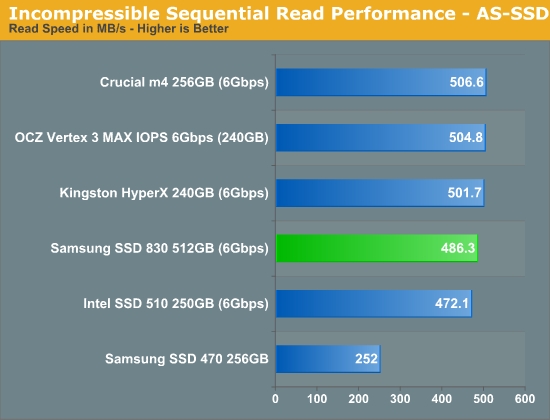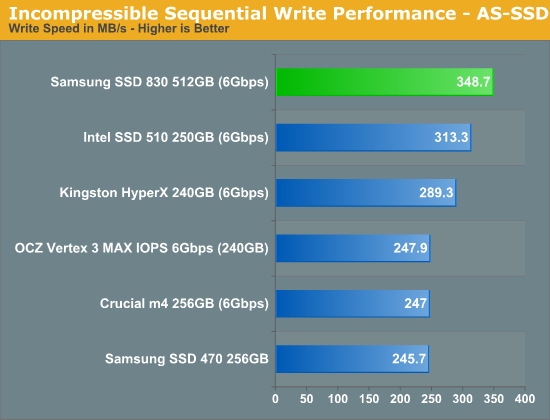The Samsung SSD 830 Review
by Anand Lal Shimpi on September 24, 2011 1:02 AM EST- Posted in
- SSDs
- Storage
- Samsung
- pm830
- Samsung SSD 830
AS-SSD Incompressible Sequential Performance
The AS-SSD sequential benchmark uses incompressible data for all of its transfers. The result is a pretty big reduction in sequential write speed on SandForce based controllers.


Although we saw the 830 take a backseat to the SandForce based offerings in our compressible sequential write test, the roles are reversed in our incompressible write test. Most huge sequential writes are going to be incompressible in nature (e.g. moving a H.264 movie around) so these numbers are quite relevant.










99 Comments
View All Comments
name99 - Saturday, September 24, 2011 - link
5.8W maximum power draw! Ouch.Let's note, for the record, that that means it simply won't work in a USB2 enclosure, and it work work in a USB3 enclosure (4.5W) without a Y-cable.
WTF causes this? If a magnetic hard drive can spin up on USB2 power (2.5W) I remain amazed that SSDs demand so much power when writing.
Jaybus - Tuesday, September 27, 2011 - link
The same thing that causes every transistor based device to consume power, resistivity and capacitance of the materials through which current flows. Resistance produces a loss of energy in the form of heat. Capacitance limits the rise time of the transistors, causing the duty cycle to increase as a function of frequency.Obsoleet - Thursday, January 19, 2012 - link
It's the multichannel read/writes. Takes a ton of energy even vs spinning up a portable drive like my WD Passport USB3.0 1TB.Idontcare - Saturday, September 24, 2011 - link
Loved the video too!I appreciated you candidly sharing your thoughts regarding the two schools of thought on garbage collections (real-time on-the-fly versus delayed-till-idle) :)
Brought to mind the spindle-days of setting up defrag to run during idle times versus real-time defragging that came out right before we stopped needing to defrag altogether :P
ClagMaster - Sunday, September 25, 2011 - link
For most enthusiasts obscessed with performance with money to burn, they seem to care mostly about either bandwidth or cost. They upgrade frequently and seem not to care about longterm value.For the vast majority of mainstream users, who use there computers for creating products and services of lasting (and repeatable) value, ... in short long term value. Mainstream users care the most about reliability, good support, good performance, capacity and then cost.
Thank you for your qualitative comments about the reliability of the SSDs from Samsung (and their rebranders) and its good reputation with Apple and other OEMs for their reliability. I care much more about reliability than I do some of the mind-numbing comparisons that are shown of bandwidth differences spanning about 15% from good to poor. I would rather take a 15% hit in performance from the latest and greatest Vertex III and enjoy 5 years of trouble free operation.
The two most reliable brands of SSD out there is Intel and Samsung according to Anand. Although Intel is more pricy, they offer better firmware and utility support. Like their branded motherboards (which enthusiasts mock for their conventionality but respect for their reliability), I believe Intel does active testing of their SSD's for reliability and longetivity and provides firmware support to make sure that happens. All of its other competitors do not. That is why I now have a 120 GB 510 Series on my PC.
Clearly Samsung and Intel SSD are going to be the choice for business applications.
Fun Guy - Monday, September 26, 2011 - link
"According to Anand...." Is Anand God?Nothing against the guy, but he's just a guy, and he earns money off of this site. No telling how that sways his views (consciously, or unconsciously).
I'll take the aggregate reviews over at New Egg, over any single website operator any day of the week.
JarredWalton - Monday, September 26, 2011 - link
I'd personally take Google and other aggregations of data over Newegg reviews.Jaybus - Tuesday, September 27, 2011 - link
I wouldn't. Disgruntled consumers are far more likely to review than satisfied consumers. Also, NewEgg doesn't post how many items have been sold. It is impossible to determine whether the number of one egg reviews is statistically relevant without knowing how many were purchased.tzhu07 - Friday, December 2, 2011 - link
Yup, this is true. Not to mention the tons of people at Newegg that 1-star products over issues that don't have anything to do with the product itself. For example, not getting rebates.ClagMaster - Wednesday, September 28, 2011 - link
Anand is not God.Anand is an IT professional who operates a hardware review site that I enjoy patronizing for nearly 10 years.
I respect Anand's opinions. And yes, there are some instances where I felt his opinions might have been swayed. But overall, his opinions have stood the tests of time.
I simply appreaciate Anands comments on reliability -- singling out Intel and Samsung drives for a good reputation for reliability and support (Intel).
I think Intel works very hard making sure their motherboards, peripherals and SSD's are reliabile. Intel has a facility in Oregon where they extensively test their motherboards. I am impressed because no other motherboard vendor does this.